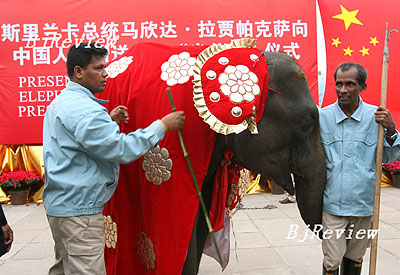
This year marks a half-century of diplomatic relations between China and Sri Lanka. To commemorate the event, Sri Lankan President Mahinda Rajapaksa visited China in early spring. After his visit, he discussed his views on bilateral relations and world affairs in a written interview with Beijing Review.
Beijing Review: The year 2007 marks the 50th anniversary of the establishment of diplomatic relations between China and Sri Lanka. How do you regard the countries' relationship over that period and what is your expectation for the future development of bilateral relations?
Mahinda Rajapaksa: The last 50 years of relations between our two countries have been very fruitful. In fact Sri Lanka recognized the People's Republic of China shortly after its establishment. We also signed an important trade agreement in 1952 before we established formal diplomatic relations. That agreement was historic. I understand it was the first major agreement signed by the People's Republic of China with a non-communist country. Today there is a sense that countries with different political and economic systems can nevertheless work together and cooperate.
Sri Lanka was the first country to prove this theory in practice with China. On the basis of these solid beginnings, our expectations about the future of Sino-Sri Lankan relations are optimistic. During this visit to China we were able to sign eight agreements and memorandums of understanding on a wide variety of subjects. They include economic and technical cooperation, investment promotion, cultural relations, the development of agriculture, academic exchanges and technology transfers which involved the donation of eye corneas to China to enable the blind to see.
In addition, we have also signed an Agreement of Cooperation and Friendship between the district of Hambantota in Sri Lanka and the city of Guangzhou. This is important, as Hambantota, which is one of Sri Lanka's less-developed districts, will soon have a harbor development project with shipping-related facilities and oil storage facilities. We hope eventually to establish an Export Promotion Zone in the district. Hambantota is an excellent location halfway between China on the one side and African, European and Arab countries on the other. It will become an important center for Chinese trade as well as other economic activities. This could also be linked, in a way, with discussions now proceeding between Sri Lanka and Chinese companies for exploration and development of our offshore oil deposits.
Another important aspect of our relationship has been Sri Lanka's steadfast commitment to the "one China policy" in all our international relations. Sri Lanka has been supportive of the People's Republic of China in all international forums, and we appreciate very much China 's support for us as a friendly developing country.
Recently, a delegation from the Chinese Culture Ministry visited Sri Lanka. How would you describe the current cultural exchanges between the two countries?
In addition to economic relations, the religious and cultural relations between our two countries have developed from ancient times. Many people know that the Chinese monk Fa Xian spent two years in Sri Lanka copying the sacred texts of Buddhism, which he took back to China.
I am aware that dealing with China is not just dealing with a country, but an engagement with an entire civilization, including its religious, cultural, artistic, social and economic stature. Sri Lanka has already signed a cultural agreement with China, and during this Year of China-Sri Lanka Friendship we will be having exchanges of cultural troupes as well as film festivals where our people can see and experience each other's culture and arts.
At the religious level, I was happy to present, on behalf of the people of Sri Lanka, a stone replica of a famous Sri Lankan 4th century statue of the Buddha in the state of meditation (Samadhi). I believe this will also be a major focal point at the Lingguang Temple for more religious exchanges as well.
| 